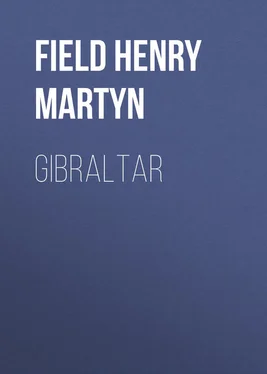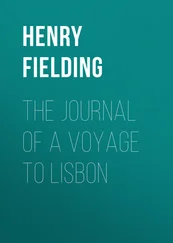Henry Field - Gibraltar
Здесь есть возможность читать онлайн «Henry Field - Gibraltar» — ознакомительный отрывок электронной книги совершенно бесплатно, а после прочтения отрывка купить полную версию. В некоторых случаях можно слушать аудио, скачать через торрент в формате fb2 и присутствует краткое содержание. Жанр: foreign_antique, foreign_prose, на английском языке. Описание произведения, (предисловие) а так же отзывы посетителей доступны на портале библиотеки ЛибКат.
- Название:Gibraltar
- Автор:
- Жанр:
- Год:неизвестен
- ISBN:нет данных
- Рейтинг книги:5 / 5. Голосов: 1
-
Избранное:Добавить в избранное
- Отзывы:
-
Ваша оценка:
- 100
- 1
- 2
- 3
- 4
- 5
Gibraltar: краткое содержание, описание и аннотация
Предлагаем к чтению аннотацию, описание, краткое содержание или предисловие (зависит от того, что написал сам автор книги «Gibraltar»). Если вы не нашли необходимую информацию о книге — напишите в комментариях, мы постараемся отыскать её.
Gibraltar — читать онлайн ознакомительный отрывок
Ниже представлен текст книги, разбитый по страницам. Система сохранения места последней прочитанной страницы, позволяет с удобством читать онлайн бесплатно книгу «Gibraltar», без необходимости каждый раз заново искать на чём Вы остановились. Поставьте закладку, и сможете в любой момент перейти на страницу, на которой закончили чтение.
Интервал:
Закладка:
The steamer anchors in the bay, half a mile from shore, and a boat takes us off to the quay, where after being duly registered by the police, we are permitted to pass under the massive arches, and through the heavy gates of the double line of fortifications, and enter Waterport Street, the one and almost only street of Gibraltar, where we find quarters in that most comfortable refuge of the traveller, the Royal Hotel, which, for the period of our stay, is to be our home.
When I stepped on shore I was among strangers: even the friend who had been my companion through Spain had remained in Cadiz, since in coming under the English flag I had no longer need of a Spanish interpreter, and I felt a little lonely; for inside these walls there was not a human being, man or woman, whom I had ever seen before. Yet one who has been knocked about the world as I have been, soon makes himself at home, and in an hour I had found, if not a familiar face, at least a familiar name, which gave me a right to claim acquaintance. Readers whose memories run back thirty years to the laying of the first Atlantic Cable in 1858, may recall the fact that the messages from Newfoundland were signed by an operator who bore the singular name of De Sauty, and when the pulse of the old sea-cord grew faint and fluttering, as if it were muttering incoherent phrases before it drew its last breath, we were accustomed to receive daily messages signed "All right: De Sauty!" which kept up our courage for a time, until we found that "All right" was "All wrong." The circumstance afforded much amusement at the time, and Dr. Holmes wrote one of his wittiest poems about it, in which the refrain of every verse was "All right: De Sauty!" Well, the message was true, at least in one sense, for De Sauty was all right, if the cable was not. The cable died, but the stout-hearted operator lived, and is at this moment the manager of the Eastern Telegraph Company in Gibraltar. This is one of those great English companies, which have their centre in London, and whose "lines have" literally "gone out through all the earth." Its "home field" is the Mediterranean, from which it reaches out long arms down the Red Sea to India and Australia, and indeed to all the Eastern world. Its General Manager is Sir James Anderson, who commanded the Great Eastern when she laid the cable successfully in 1866. I had crossed the ocean with him in '67, and now, wishing to do me a good turn, he had insisted on my taking a letter to all their offices on both sides of the Mediterranean, to transmit my messages free! This was a pretty big license; his letter was almost like one of Paul's epistles "to the twelve tribes scattered abroad, greeting." It contained a sort of general direction to make myself at home in all creation!
With such an introduction I felt at home in the telegraph office in Gibraltar, and especially when I could take by the hand our old friend De Sauty. He has a hearty grip, which speaks for the true Englishman that he is. If any of my countrymen had supposed that he died with the cable, I am happy to say that he not only "still lives," but is very much alive. He at once sent off to London a message to my friends in America – a good-bye for the old year, which brought me the next morning a greeting for the new.
From the telegraph office I took my way to that of the American Consul, who gave me a welcome such as I could find in no other house in Gibraltar, since his is the only American family! When I asked after my countrymen (who, as they are going up and down in the earth, and show themselves everywhere, I took for granted must be here), he answered that there was "not one!" He is not only the official representative of our country, but he and his children the only Americans. This being so, it is a happy circumstance that the Great Republic is so well represented; for a better man than Horatio J. Sprague could not be found in the two hemispheres. He is the oldest Consul in the service, having been forty years at this post, where his father, who was appointed by General Jackson, was Consul before him. He received his appointment from President Polk. Through all these years he has maintained the honor of the American name, and to-day there is not within the walls of Gibraltar a man – soldier or civilian – who is more respected than this solitary representative of our country.
Some may think there is not much need of a Consul where there are no Americans, and yet nearly five hundred ships sailed from this port last year for America: pity that he should have to confess that very few bore the American flag! Thus the post is a responsible one, and at times involves duties the most delicate and difficult, as in the late war, when the Sumter was lying here, with three or four American ships off the harbor (for they were not permitted to remain in port but twenty-four hours) to prevent her escape. At that time the Consul was constantly on the watch, only to see the privateer get off at last by the transparent device of taking out her guns, and being sold to an English owner, who immediately hoisted the English flag, and put to sea in broad daylight in the face of our ships, and made her way to Liverpool, where she was fitted out as a blockade-runner!
Those were trying days for expatriated Americans. However, it was all made up when Peace came, and Peace with Victory – with the Union restored and the country saved. Since then it has been the privilege of the Consul at Gibraltar to welcome many who took part in the great struggle, among them Generals Grant and Sherman and Admiral Farragut. Of course a soldier is always interested in a fortress, for it is in the line of his profession; and the greatest fortification in the world could but be regarded with a curious eye by old soldiers like those who had led our armies for four years; who had conducted great campaigns, with long marches and battles and sieges – battles among the bloodiest of modern times, and one siege (that of Richmond) which lasted as long as the famous siege of Gibraltar.
But perhaps no one felt a keener interest in what he saw here than the old sea-dog, who had bombarded the forts at the mouth of the Mississippi six days and nights; had broken the heavy iron boom stretched across the river; and run his ships past the forts under a tremendous fire; only to find still before him a fleet greater than his own, of twenty armed steamers, four ironclad rams, and a multitude of fire-rafts, all of which he attacked and destroyed, and captured New Orleans, an achievement in naval warfare as great as any ever wrought by Nelson. To Farragut Gibraltar was nothing more than a big ship, whose decks were ramparts. Pretty long decks they were, to be sure, but only furnishing so many more port-holes, and carrying so many more guns, and enabling its commander to fire a more tremendous broadside.
Talking over these things fired my patriotic breast till I began to feel as if I were in "mine ain countrie," and among my American kinsmen. And as I walked from the Consul's back to the Royal Hotel, I did not feel quite so lonely in Gibraltar as I felt an hour before.
As the afternoon wore away, the Spaniards who had come in from the country to market, to buy or sell, began to disappear, and soon went hurrying out, while the belated townsmen came hurrying in. At half-past five the evening gun from the top of the Rock boomed over land and sea, and with a few minutes' grace for the last straggler, the gates of the double line of fortifications were closed for the night, and there was no more going out or coming in till morning. It gave me a little uncomfortable feeling to be thus imprisoned in a fortress, with no possibility of escape. The bustling streets soon subsided into quietness. At half-past nine another gun was the signal for the soldiers to return to their barracks; and soon the town was as tranquil as a New England village. As I stepped out upon the balcony, the stillness seemed almost unnatural. I heard no cry of "All's well" from the sentinel pacing the ramparts, as from sailors on the deck, nor the "Ave Maria santissima" of the Spanish watchman. Not even the howling of a dog broke the stillness of the night. The moon, but in her second quarter, did not shut out the light of stars, which were shining brightly on Rock and Bay. Even the heavy black guns looked peaceful in the soft and tender light. It was the last night of the year – and therefore a holy night, as it was to be marked by a Holy Nativity – the birth of a New Year, a "holy child," as it would come from the hands of God unstained by sin. A little before midnight I fell asleep, from which I started up at the sound of the morning gun. The Old Year was dead! He had been a long time dying, but there is always a shock when the end comes. And yet in that same midnight a new star appeared in the East, bringing fresh hope to the poor old world. Life and death are not divided. The very instant that the old year died, the new year was born; and soon the dawn came "blushing o'er the world," as if such a thing as death were unknown. The bugles sounded the morning call, as they had sounded for the night's repose. Scarcely had we caught the last echoes, that, growing fainter and fainter, seemed to be wailing for the dying year, before a piercing blast announced his successor. The King is dead! Long live the King!
Читать дальшеИнтервал:
Закладка:
Похожие книги на «Gibraltar»
Представляем Вашему вниманию похожие книги на «Gibraltar» списком для выбора. Мы отобрали схожую по названию и смыслу литературу в надежде предоставить читателям больше вариантов отыскать новые, интересные, ещё непрочитанные произведения.
Обсуждение, отзывы о книге «Gibraltar» и просто собственные мнения читателей. Оставьте ваши комментарии, напишите, что Вы думаете о произведении, его смысле или главных героях. Укажите что конкретно понравилось, а что нет, и почему Вы так считаете.












